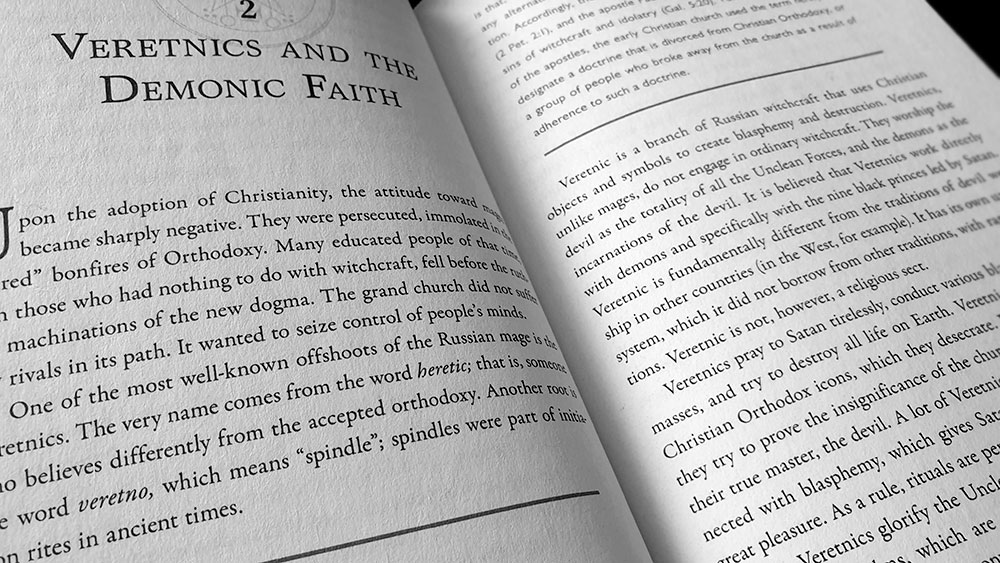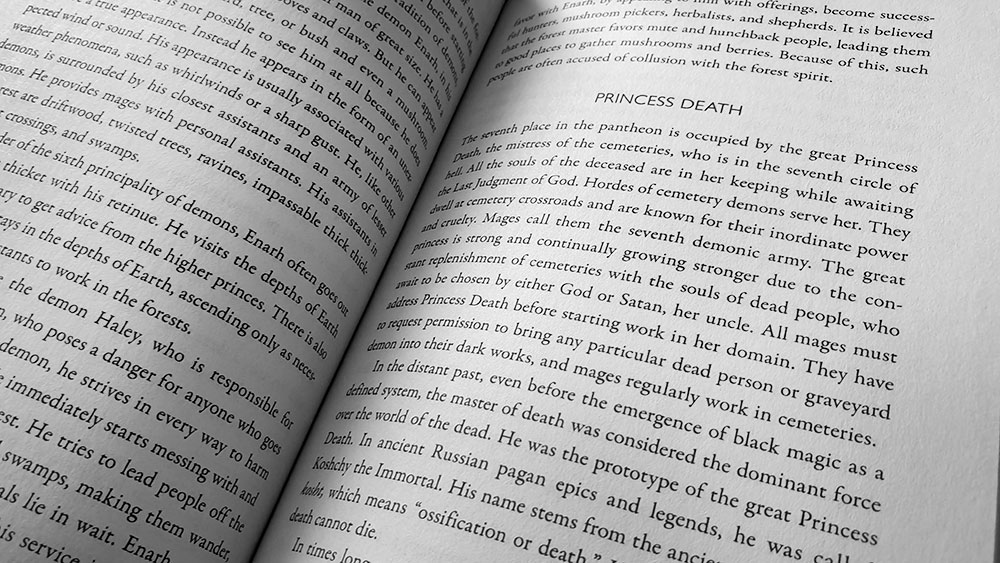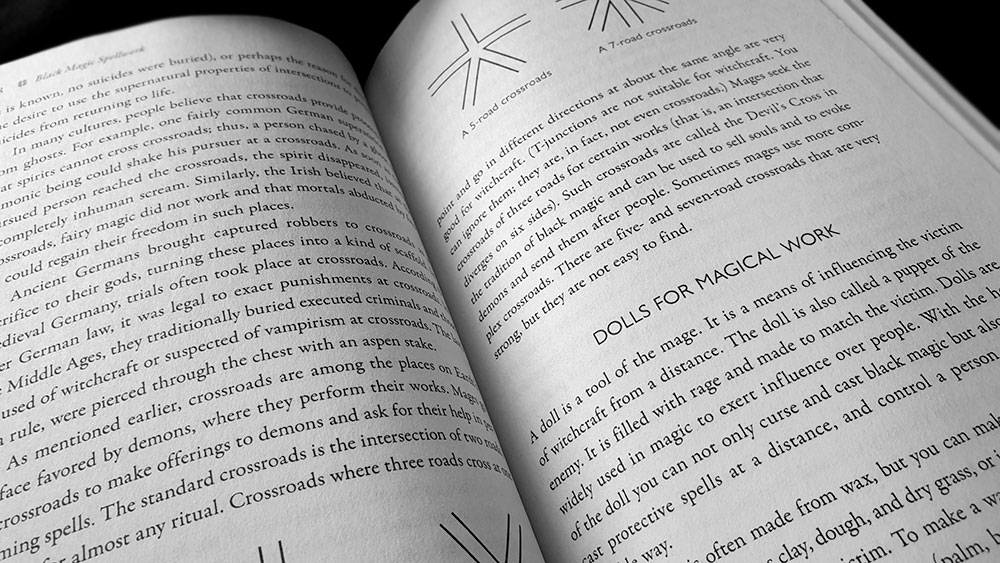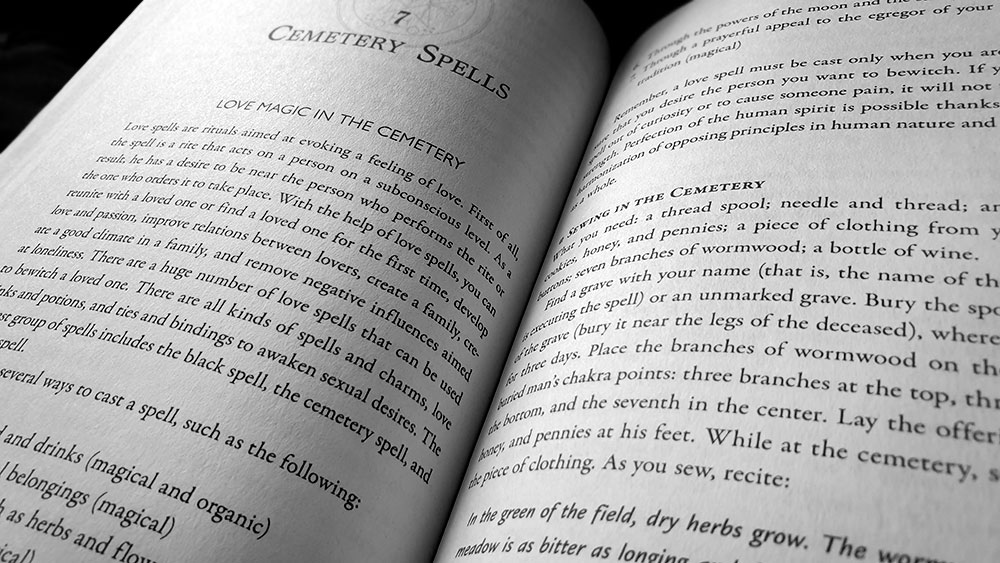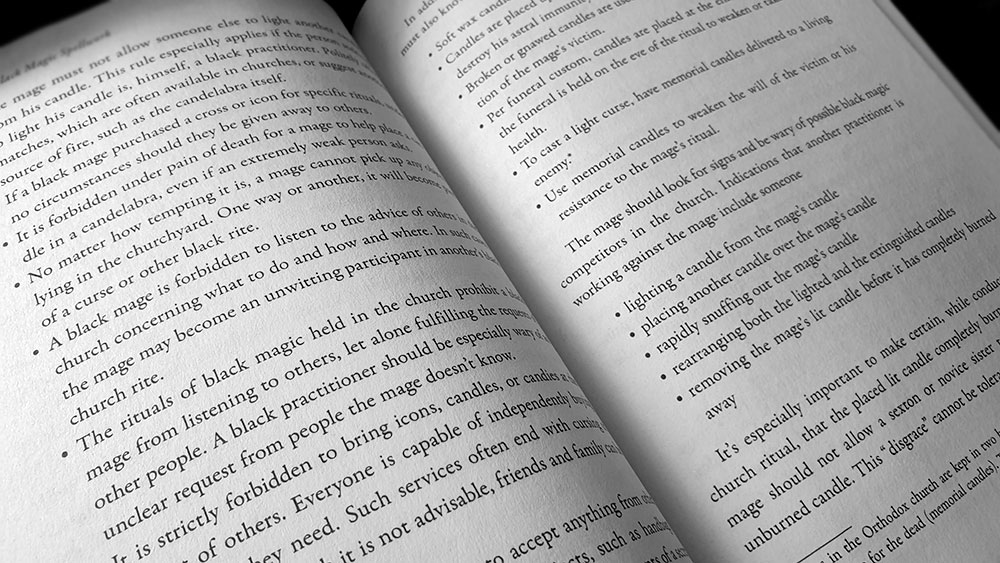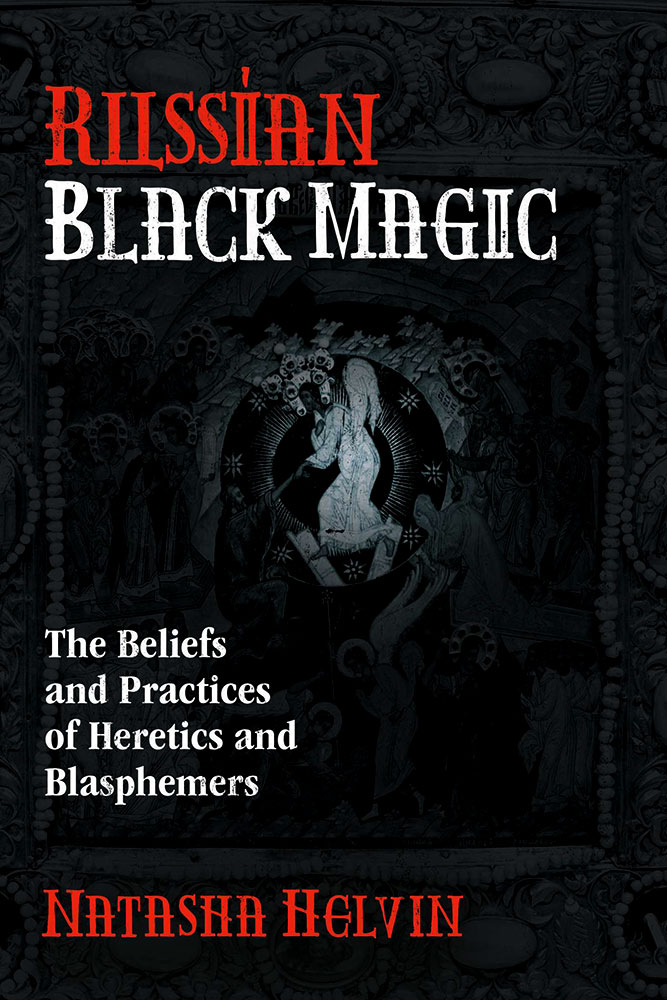 Picking up where her previous book Slavic Witchcraft left off, Natasha Hevin’s Russian Black Magic turns a dark corner into regions unequivocally black. While its predecessor considered fairly generic folk magic, with, as the review attested, some psychologically-questionable attitudes towards consent and mental wellbeing, the negativity here is of a more glamourous kind, with a book whose explicit diabolism might seem at odds with something as New Age-adjacent as the Destiny Books imprint of Inner Traditions.
Picking up where her previous book Slavic Witchcraft left off, Natasha Hevin’s Russian Black Magic turns a dark corner into regions unequivocally black. While its predecessor considered fairly generic folk magic, with, as the review attested, some psychologically-questionable attitudes towards consent and mental wellbeing, the negativity here is of a more glamourous kind, with a book whose explicit diabolism might seem at odds with something as New Age-adjacent as the Destiny Books imprint of Inner Traditions.
Helvin divides her book into two halves, the first and shorter being a history and theory lesson, whilst the second is a practical spellbook, a Black Magic Spellbook, as it plainly says on the tin. As an indicator of the grimdark vibe, if this wasn’t enough, Russian Black Magic is preceded by the de rigueur cautionary note warning that anyone who performs these spells does so at their own risk, and Helvin and the publishers accept no liability. Neat.
Helvin writes in a forceful almost proselytory manner with a sometimes unwarranted confidence, dispensing categorical statements sans examples and evidence when something more circumspect or empirical would be warranted. This is on display in the first chapter where she gives a basic outline of magical principles before describing the mages that practiced it prior to, and following, the Christian conversion of Russia. Despite apparently being heirs to a system that had been honed and systematised for centuries, these ill-defined mages exist in a temporally-unspecified murk of history. There’s no names given, no references to historical records, barely any specific locations, just this vaguely-defined idea that these mages have been out there, doing their mage thing for many mage years. There’s not even an appeal to authority via some mysterious claim to a magical lineage, just categorical statements about something that can’t really be fact-checked on account of the dearth of facts to check.
It’s not just the lack of specific history that makes for an infuriating read but also statements so sure of themselves that the self-belief is staggering, such as when Helvin casually refers to Western ceremonial magic as the opposite of Catholicism because of its, would you believe, black mass. She also identifies Russian black magic as dual faith and claims with admirable audacity that dual faith is an “exclusively Russian phenomenon; it has no equivalent in other cultures.” This is particularly amusing given that one of the one of the favourite comparisons that Helvin makes for her Russian Black Magic is Vodou whose fundamental syncretism is the very definition of a dual faith.
In her second chapter, Helvin introduces another form of magic workers, distinct from mages from which they sprung, the Veretnics or heretics. At last, an actual name, one might foolishly say, but Google return results almost exclusively related to this book, and nothing independent; though presumably the name is meant to be related to the Russian erétik (‘heretic’). But if you want made up names, have we got you sorted, because in her third chapter we meet the demonic pantheon of this system. Satan’s there, all good (although he is only designated as a prince, which feels like short changing oneself when you make a big deal about wanting to reign in Hell), but then his companions are all unfamiliar and largely un-Googleable etymologically-diverse faces. There’s Prince Veligor, Prince Versaul, Prince Enarh, Princess Death, Prince Indik, and Prince Mafawa. One of these demonic princes does have a familiar name, Enoch, but this isn’t the antediluvian patriarch of the Bible but a demon of lust and debauchery (and presumably identity theft). Another one, Prince Aspid (Satan’s nephew, according to Helvin, but really just the Russian word for ‘asp,’ is a little-known dragon from Slavic folklore, rather than a demon of greed and envy as he is here, and is the closest Helvin gets to anything authentically mythic. Helvin gives multiple paragraph descriptions of each of these demons, explaining their responsibilities and what role they played in the rebellion in heaven, which is just silly as it’s all patently made by her out of whole cloth. One could easily create an interesting pantheon that had some Slavic connection to either folklore or pre-Christian mythology to give it an air of authenticity, while still adding glamour with some demonic sheen. But to spend so much time on your war in heaven fanfiction without making it even remotely fit the brief seems like a consummate waste. Similarly, there’s nothing wrong with making up your own cosmology and pantheon, cultures have been doing it for millennia, but to weakly try and pass it off as some ancient Russian tradition serves no purpose.
Helvin follows her demonic pantheon with chapter on cosmology that segues into a discussion about the definitions of Satanism and paganism, There’s a retelling of the story of creation and the war in heaven, filled with lots of other embellished details delivered with undeserved confidence and in one instance, an appeal to authority referencing a legend (from an unspecified time, place and culture) that hasn’t previously existed. When it comes to define Satanism and what it is and is not, there’s a lot of ponderous waffling, the kind of near incoherent but strangely didactic tone and structure one would expect in a self-published guide to the dark arts, where the writer is so sure they’ve got this intellectual stuff down and it’s all going so well… “look at me ma, I’m writing, I’m really writing.” Helvin’s definitions, be they of Satanism or paganism, always feel a little off, divorced from reality and experience; an ambiguous sensation that is then compounded, not assuaged, by her unwarranted certainty. The rituals and ceremonies that pagans perform are, apparently, “quite pleasant for their participants” with music, dancing, alcoholic beverages and, gosh, “interaction with the opposite sex” phwoah. We could pick out other moments to critique but it’s not worth the effort, suffice to say, it goes on and on, page after page, periodically devolving into convoluted literary miasma and making it apparent that there was never an editor going “maybe you should reign it in and tighten this up.”
With it now being time for the Black Magic Spellbook section, let’s rub those hands together and get busy. Well, busy after some ponderous theorising about the principles of magic, sprinkled with some faulty etymology, poorly cited folklore, mixed mythologies, interminable fluff and the ever present insufferable pontificating. When it does get to the magic, after all this talk about century-long mages, it’s a little disappointing because it’s pretty much just the same kind of old folk magic from Helvin’s previous ill-considered book, but this time, you do it in a cemetery because it’s darque. Lots of love spells (in the cemetery), divorce spells (in the cemetery), death and harm spells (in the cemetery), followed by another chapter of similar sortilege but in a church. It all concludes with a chapter of more of the same but these ones are under the glamorous title of The Thirteen Veretnic Spells of Evil which at least live up to the hype with their cartoonish diabolism, destroying icons and images of the trinity, trampling a crucifix under foot, all the hits. Fun times.
In all, this makes for a very odd book, particularly, as noted, with it being released by a conventional metaphysical publisher like Inner Tradition’s Destiny Books imprint. Helvin’s unwarranted confidence grates, and this is especially compounded by the sloppy writing and editing, not to mention the comical enthusiasm for grimdark diabolism. It’s hard to tell who the audience for a title like this was, with its lack of genuinely Russian elements doing a disservice to anyone who comes to it looking for that, while its publication by a New Age publisher may restrict its appeal to any angsty teen starting out on an antisocial path of antichristian occult mastery.
Published by Destiny Books
